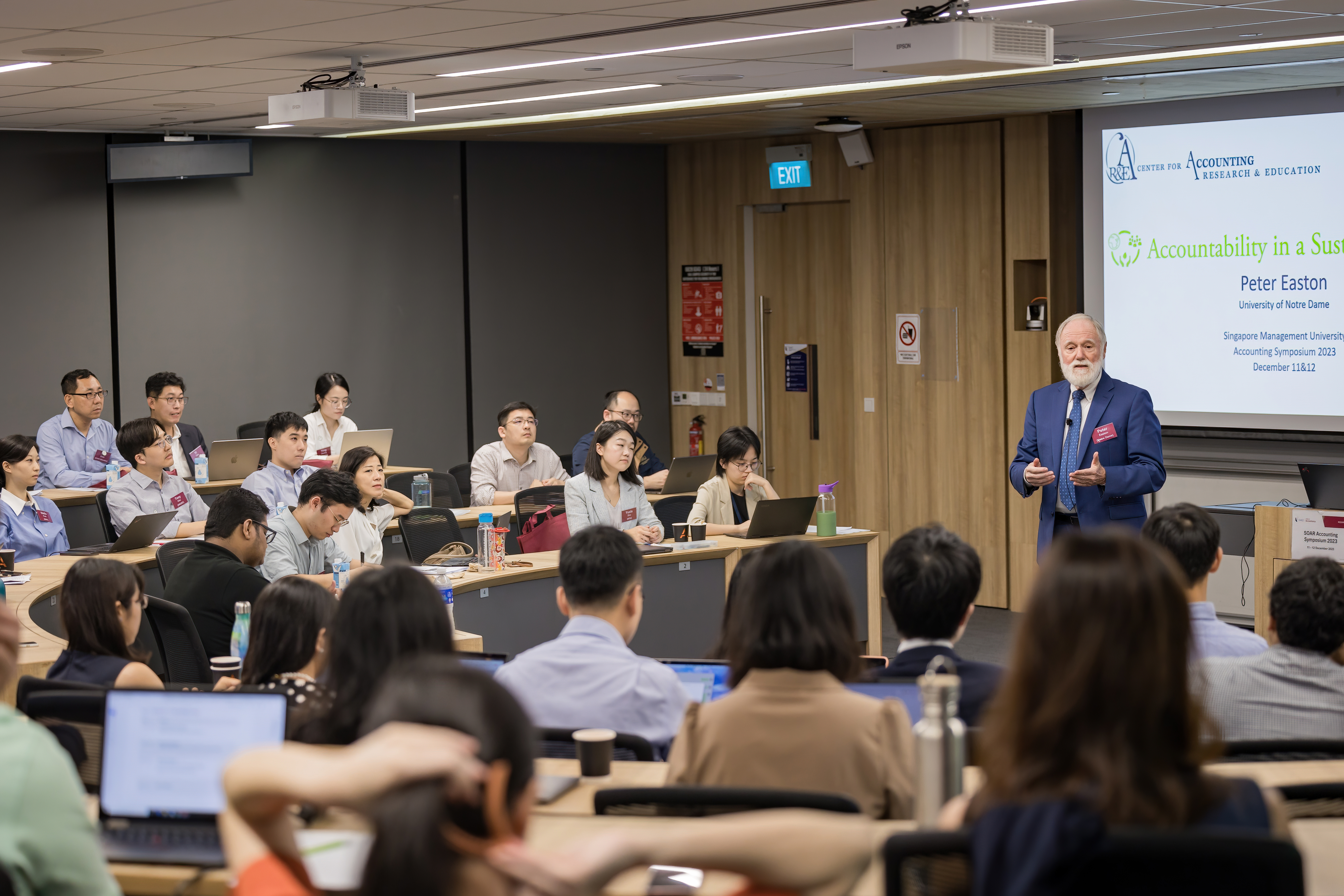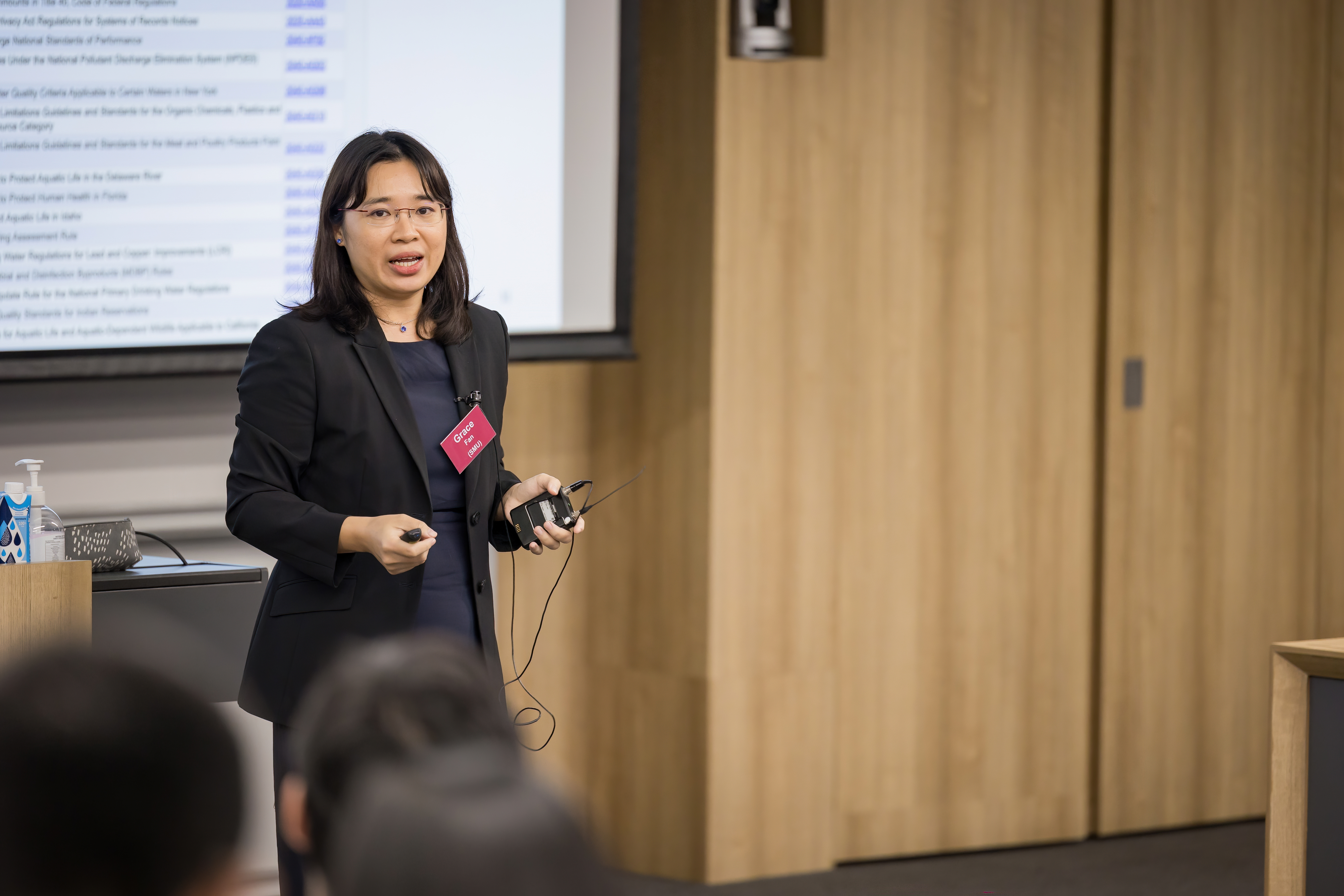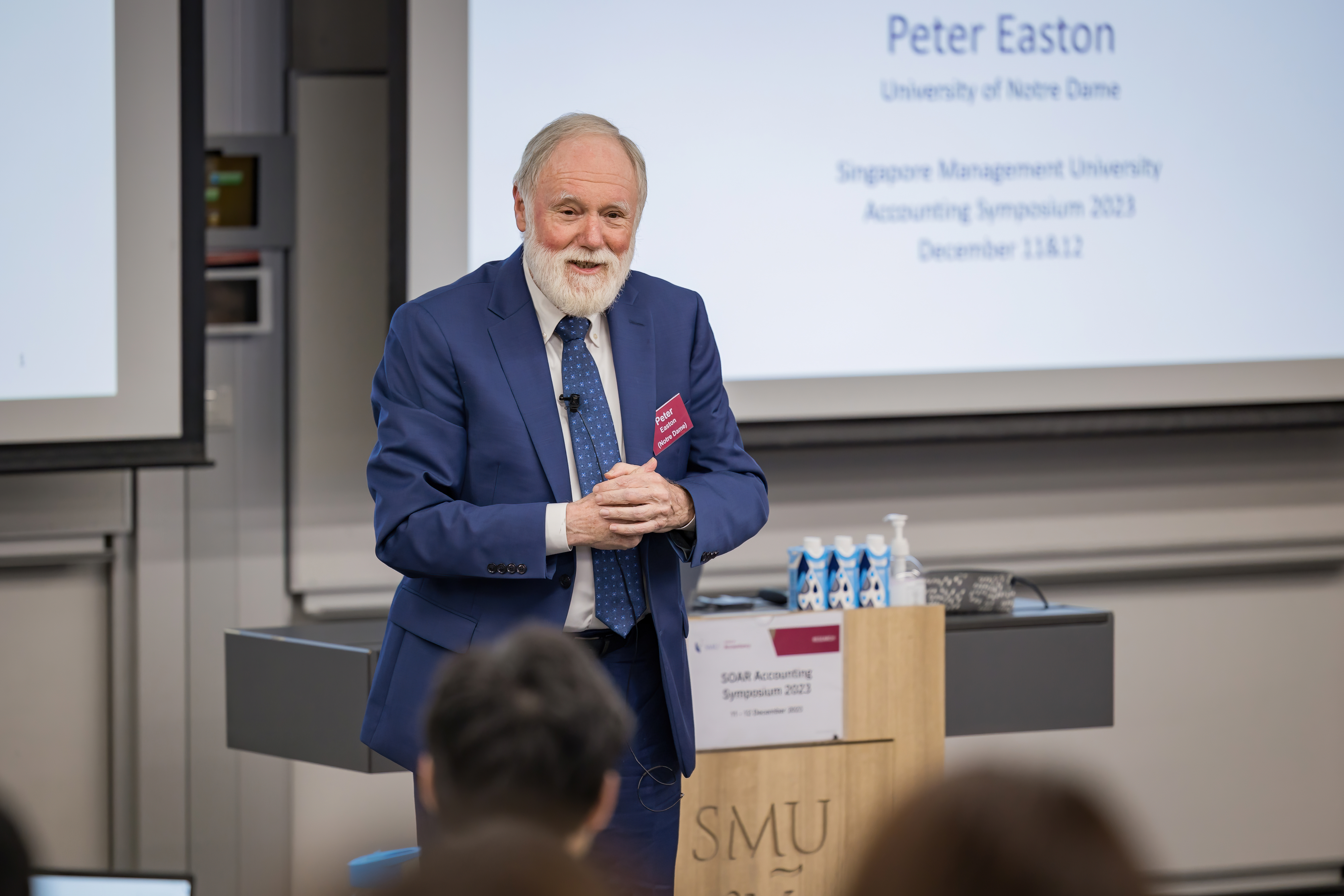
This year’s SMU School of Accountancy Research (SOAR) Accounting Symposium was held on 11 and 12 December 2023, and saw 140 research papers submitted – continuing the upward trend for the annual accountancy-research event.
The symposium provides a platform for researchers from SMU’s School of Accountancy (SOA) and top institutions of higher education from around the world to share ideas, stimulating debate through paper presentations and discussions. In turn, the discussions surrounding the papers also provide salient points for the researchers to further improve their research papers before submission for publication.

Professor Liandong Zhang, Deputy Dean of SOA, delivering his opening remarks
In his opening remarks, Professor Liandong Zhang, Deputy Dean of SOA commented on the number of high-quality submissions, and noted that he had initially believed last year’s high number of submissions to be a result of the backlog caused by COVID-19. However, he was most pleased to see this upward trend continuing.
Each submitted paper was curated by the Organizing Committee of SMU-SOAR Accounting Symposium to ensure quality, as well as diversity in topics and region of authors; and seven papers were finally selected to be presented at the event.
Of the seven, three were related to sustainability – a reflection of the urgency of the climate crisis, as well as the important role that accountancy plays in sustainability, one of the core issues that SMU continues to emphasize.
Detailing how accounting is key for a sustainable world
Addressing the link between accountancy and sustainability in his keynote speech for the symposium, Professor Peter Easton shared his perspective – that accountants are in fact at the heart of sustainability.
Prof Easton spoke on the topic of "Accountability in a Sustainable World". Click image to view video recording of keynote speech.
Professor Easton is an Alumni Professor of Accountancy at the University of Notre Dame, Academic Director of the University’s Centre for Accounting Research and Education (CARE), as well as the Editor-in-Chief of Accountability in a Sustainable World Quarterly, a peer-reviewed journal that publishes papers written by both academics and practitioners.
“There is no sustainability without accounting. It makes no sense if you don’t measure emissions,” said Professor Easton, going on to share quotes and speeches from high-profile speakers at this year’s CARE conference and other sustainability events. Many of these events all point to one thing in common: that solid accounting is necessary to properly report on and allow tracking of sustainability issues.
In short, without ESG reporting to quantify the sustainability efforts of an organisation, it becomes extremely difficult if not impossible to track properly. This makes accountants central to sustainability efforts – their work makes organisations accountable to their stakeholders and customers, rather than just paying lip service to green issues.
Examining the effects of overall environmental regulations and firm values and innovation
Among the papers presented on the first day of the symposium was one by Assistant Professor Grace Fan from SMU’s SOA, who presented her work co-authored with Assistant Professor Xi Wu from the Accounting Group at Haas School of Business. Titled “Going Green: The Effect of Environmental Regulations on Firms”, the pair sought to study the effect of environmental regulations on firms.

Prof Fan presents her paper "Going Green: The Effect of Environmental Regulations on Firms"
While other such studies exist, many of these tend to focus on specific regulations and their effects. Providing a wider-picture view, Prof Fan’s paper constructed a time-varying industry measure of all the EPA regulatory restrictions.
To test the effect of the regulations, the authors identified large changes that exceeded two standard deviations from the mean of any given industry. They then looked at a three-year period after this large change and examined its impact on firm pollution, valuation, and future innovations.
The findings indicated a strong positive association between EPA regulations and firm valuation for the regulated US public firms that follow stringent EPA regulations. In states where such regulations can be enforced more strictly, the effect was found to be larger.
In addition, more patents and green patents were filed in the three years following the introduction of the EPA regulation, implying that changes in EPA regulations also induced more green innovations, which in turn contribute to the increase in the firms’ value.
Given that innovation investments are value-enhancing, why then do firms have to be regulated into doing this?
“Investment into innovations tend to be viewed as risky, and typically take years to deliver results – hence firms might not take this step until the introduction of new EPA regulations necessitates this step,” Prof Fan suggests.
“What this [positive association between EPA regulations and firm valuations] indicates is that environmental regulations are not always bad for a company,” she says, bringing her presentation to a close.
The effects of an accountant shortage
Kicking off the second day of the symposium was a paper that looked into the impact that a shortage of accountants had on the quality of internal control over financial reporting. SMU SOA Associate Professor Rencheng Wang served as the discussant for this paper.
Assistant Professor Yue Zheng from the Hong Kong University of Science and Technology presented on behalf of co-authors, Professor Rebecca Hann, Dean’s Professor of Accounting at the University of Maryland’s Robert H Smith School of Business; and Jingwen Yang, a PhD Candidate in Accounting and Information Assurance under Professor Hann.
Looking at the time it took for accounting job postings to fill in the US, the authors found a substantial increase over 14 years, with the average duration of a job’s vacancy increasing from 43 days in 2008 to 56 days in 2022. The team also found that firms that take longer to fill accounting vacancies are more likely to experience internal control weaknesses (ICWs). This effect is more pronounced for smaller firms and for firms with fewer human resources. In addition, they documented that longer duration also leads to late filings of financial reports.
These findings provide the first large-sample archival evidence on the costs of accountant shortages, highlighting the importance of attracting and retaining accounting talent.
.jpg)
Prof Wang Rencheng discussing the paper "The Price of an Accountant Shortage"
Discussant Associate Professor Rencheng Wang recommended exploring further whether weak internal controls may occur in equilibrium, particularly for small firms. For instance, management might perceive the risks associated with a lack of segregation as insignificant, and the potential benefits of adding employees to clearly segregate duties may not justify the associated expenses.
Prof Wang also referenced a previous study, which suggested that although late filings were associated with lower financial-reporting quality, these effects could be largely mitigated by having one of the Big Four accounting firms audit their reports. He suggested that the team investigate if the affected firms in their own study used auditors from the Big Four accounting firms, and shed more light on whether late filings are costly for affected firms.
Furthermore, Prof Wang proposed additional suggestions, including looking classifying ICWs by their severity and providing more direct evidence on the economic significance of these findings, which would help organisations to convince their shareholders about the necessity of addressing this talent shortage.
